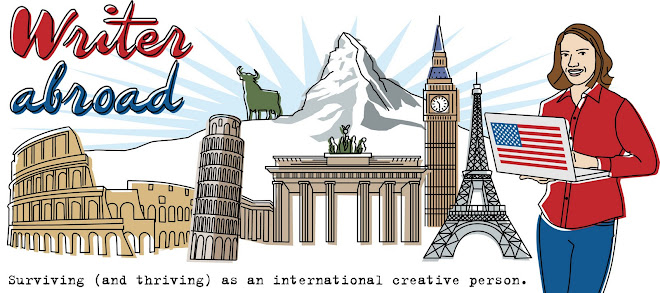Writer
Abroad is reading the most amazing book. It talks candidly about writing and
money. Yes, money.
Money? Stop
the press. Aim the camera. Point it at something completely taboo: A writer
talking about money. Actually, 33 writers talking about money.
What?
Writers
never talk about money. And if they do, it’s usually in the vein of, Well, should I write for free? I mean, I’ll
get exposure.
Stop with
the exposure thing already. Stop.
Admittedly,
Writer Abroad is only on page 29, but she’s in love with Manjula Martin’s new
book, Scratch: Writers, Money, and the Art of
Making a Living. Here’s the best line so far:
“People
wonder when you’re allowed to call yourself a writer. I think maybe the answer
is when you recognize that it (writing) is work.”
Wow,
imagine that. Writing is work. And guess what? The writers who successfully write
full time realize this. After all, do lawyers work for free? Do plumbers fix
your water heater for free? Why do writers think they should be any different?
If you want
to make writing a career here’s the hard truth: you have to talk about money.
And you have to turn writing into work no matter how much you love it. And you
have to also learn to say no. No to no pay. No to low pay. And no to bad
contracts. Even if they mean publication. Especially if they mean publication.
Writer
Abroad always turns down offers if they include no pay, low pay, or bad
rights-grabbing contracts for work she knows she could use later. Working
writers must do this. Why? Because they need time to write things for the
publications and companies that actually respect the work they do. If writers
write for people who don’t respect them, writers lose. There’s only so much
time in a day.
In Scratch, there’s a great interview with
Cheryl Strayed about how she had written a bestseller and still couldn’t pay
the rent. These are things writers need to hear. Thank you, thank you, Manjula
Martin, for this anthology.
Sometimes
we need to stop talking about high art and start talking about how to live the
life we want to live in order to create the things we want to create—even if,
in the end, these things result in high art.
That’s why
Writer Abroad is pleased to be on a panel entitled Career Paths in
Writing at the next Zurich Writers Workshop, which will be held in May in
Zurich, Switzerland. While on the panel, she hopes to expand on why writers
need to think of writing as a business first and an art second. But for those
who can’t attend—and even those who can—Scratch
is the new must-read book for writers.


